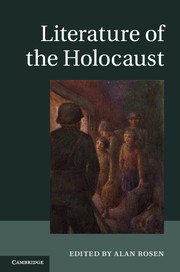Book contents
- Frontmatter
- Contents
- Notes on contributors
- Acknowledgments
- Introduction
- Part I Wartime victim writing
- Part II Postwar responses
- Chapter 3 The Holocaust and Italian literature
- Chapter 4 German literature and the Holocaust
- Chapter 5 Hebrew literature of the Holocaust
- Chapter 6 The Holocaust and postwar Yiddish literature
- Chapter 7 The Holocaust in Russian literature
- Chapter 8 The Holocaust in English-language literatures
- Chapter 9 Polish literature on the Holocaust
- Chapter 10 Hungarian Holocaust literature
- Chapter 11 French literature and the Holocaust
- Part III Other approaches
- Guide to further reading
- Index
- References
Chapter 4 - German literature and the Holocaust
Published online by Cambridge University Press: 05 June 2014
- Frontmatter
- Contents
- Notes on contributors
- Acknowledgments
- Introduction
- Part I Wartime victim writing
- Part II Postwar responses
- Chapter 3 The Holocaust and Italian literature
- Chapter 4 German literature and the Holocaust
- Chapter 5 Hebrew literature of the Holocaust
- Chapter 6 The Holocaust and postwar Yiddish literature
- Chapter 7 The Holocaust in Russian literature
- Chapter 8 The Holocaust in English-language literatures
- Chapter 9 Polish literature on the Holocaust
- Chapter 10 Hungarian Holocaust literature
- Chapter 11 French literature and the Holocaust
- Part III Other approaches
- Guide to further reading
- Index
- References
Summary
What is most striking in relation to German literature and the Holocaust – if we take this to mean writing in German ranging from first-hand accounts to fictional works – is the absence of a single defining text such as Anne Frank’s Het Achterhuis: Dagboekbrieven/The Diary of a Young Girl (1947/1952), Primo Levi’s Se questo è un uomo/If This Is a Man (1947/1958), or Elie Wiesel’s La Nuit/Night (1958/1960) which transcends its linguistic (e.g. Dutch, Italian, French) context to become part of the transnational corpus of books about the Nazi ghettos and concentration camps. Edgar Hilsenrath’s Nacht (1964), a harrowing account of life and death in the Prokow ghetto, certainly achieved some limited global impact after its 1966 release as Night, and Paul Celan’s poem “Todesfuge” (“Deathfugue,” 1948) is widely taught, but neither resonate with a wider audience in quite the same way. And the East German writer Jurek Becker’s novel Jakob der Lügner/Jacob the Liar (1969/1975, with a new translation in 1996), although turned into an Oscar-nominated foreign-language film in the mid-1970s, only became truly well known outside Germany after its 1999 adaptation as a Hollywood movie starring Robin Williams.
- Type
- Chapter
- Information
- Literature of the Holocaust , pp. 68 - 83Publisher: Cambridge University PressPrint publication year: 2013



